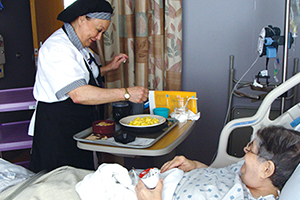By NANCY FRAZIER O'BRIEN
As the prevalence of food allergies continues to rise, especially among children, a Catholic hospital in Minnesota is confronting the problem head-on.

Nutrition assistant Gloria Koehnen serves a gluten-free meal to patient Lorraine Mix, who has both a gluten and shellfish allergy.
Essentia Health-St. Joseph's Medical Center in Brainerd, Minn., offers patients with food allergies peace of mind by preparing their meals in a separate area of the kitchen, complete with separate cutting boards, knives, utensils, pans, gloves, pot holders, aprons and toaster. Meals are delivered to patients on a separate cart.
"Food allergies are becoming a more and more prevalent issue in our patients," said Denise Cleveland, director of nutrition and environmental services at the hospital. "We as a team decided that we needed to be addressing this and providing the best and safest meals for our patients."
The kitchen prepares 150 to 200 meals a day and may only need to make three or four meals a week for patients and visitors at the special food station, which is set off from the rest of the kitchen and makes exclusive use of a purple cutting board, and food cart. Cleveland said some patients have true allergies while others express preferences for a gluten-free diet or want to avoid certain foods.
Dr. Minto Porter, an allergy and asthma specialist for Essentia Health, said about 4 percent of adults and 6 to 8 percent of children have food allergies.
"While food allergies certainly garner more media attention in recent years, studies show that food allergies have been on the rise for decades," Porter added.
The Centers for Disease Control and Prevention reported an 18 percent increase in food allergies among children from 1997 to 2007 and a nearly 50 percent increase between 1997 and 2011.
"In addition, food allergies that children historically have outgrown at a young age, such as egg and milk, seem to be resolving more slowly," Porter said.
Eight foods — milk, eggs, peanuts, tree nuts, wheat, soy, fish and shellfish — account for 90 percent of all food-allergic reactions, according to the Virginia-based organization Food Allergy Research & Education.
"Allergic reactions to foods, even very small amounts, can be fatal and at this time our only treatment is avoidance," Porter said. "Since strict avoidance of one's allergens is key, this move on the part of Essentia Health is a critical step in protecting some of our most vulnerable patients."
Here's how the Essentia-St. Joseph's process works: When the cook receives a meal order that notes a specific food allergy, he stops production on the regular food line, takes off his apron and gloves and washes his hands. Then he puts on new gloves, a new apron and works only on the allergy station.
Cleveland estimated the cost of purchasing a separate stainless-steel work station and induction burner, along with other supplies, at between $2,500 and $3,000.
"I think health care is getting on board with really trying to address this in a different manner than in the past," she said. "We are trying to be very careful and conscientious about preparing food in the safest manner for our patients."
Nutrition assistant Tracy Roach, who sometimes delivers meals from the special allergy cart, said patients are "grateful that we even know they have allergies" and often surprised at the kitchen's special efforts.
"It really impresses them that we go out of the way for them," Roach added. "It's a big deal to the patients that do have allergies."
Copyright © 2016 by the Catholic Health Association of the United States
For reprint permission, contact Betty Crosby or call (314) 253-3477.